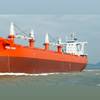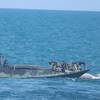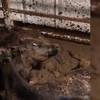ABS Reports Continuing Success, Record Fleet
Calling 2007 “a truly remarkable year,” ABS Chairman and Chief Executive Officer, Robert D. Somerville reported a record fleet size and record orderbook to the 146th Annual Members Meeting of the classification society, held in .
Acknowledging that “ABS has benefited from the quite extraordinary bull run of the last few years,” attributed much of the success of the organization to the more than 3,300 employees around the world. “I am convinced that we would not have benefited to the extent that we have without the unflagging efforts of the ABS staff,” he told the meeting. “It is the people of ABS that differentiate our services. It has been through their efforts that we have been able to consistently outpace the growth in the world orderbook.”
reported that, in the twelve months to end-2007, the ABS classed fleet grew by 9m gross tons to yet another record of 135.4m gt. The year-on-year growth was almost double that of each of the previous two years. The growth has been sustained through the first quarter of the current year, subsequently pushing the fleet to 137.3m gt at the end of March.
Also continuing to grow is the ABS orderbook for new tonnage which now stands at almost 62m gt and a market leading 20.7 percent share. particularly highlighted the society’s continuing strength in the tanker sector where it holds a clear lead with a 32 percent share, and its resurgence in the bulk carrier sector where, at the end of March, it held a 26 percent share of the world orderbook.
Continued high levels of activity in the offshore sector, on both the exploration and production sides, also provided a significant contribution to the society’s success in 2007. told the members in attendance that, at end-2007, 76 percent of all mobile offshore drilling units on order at yards around the world were contracted to be built to ABS class. This included 94 percent of all jackups on order, with the majority of those building at Singapore-based yards. It also included a 61 percent share of the very active deepwater drillship newbuilding market.
noted that classification of production units tends to more closely track the nationality of the contracting party and can be, as a consequence, a less open market. However, he was able to report that “ABS still maintained its overall market leadership in this sector with a 43 percent share of the existing fleet, nearly 20 points ahead of our nearest competitor.”
Growth has brought challenges, the ABS Chairman admitted. “It is not my position to assess the rationality of the continued pace of ordering in both the ship and offshore sectors, nor to predict if or when the inevitable slowdown will occur,” he said. “What I can say is that we are doing everything we possibly can to assist all of our clients – shipyards, shipowners, offshore operators and equipment manufacturers to meet this extraordinary workload.
“Our challenge has been to manage our success so that we can continue delivering the superior classification and related services that we pride ourselves on and which our clients have come to expect from us. To do that, we have been focused on staffing.”
Referring to the current high demand for quality, experienced marine personnel, Somerville noted that the global nature of the society’s business and the strength of its reputation has meant that “we have been able to find, attract and train appropriately qualified recruits from across the globe, particularly in China which has been the area of our activities that has experienced the fastest growth.”
The society added more than 350 professional staff in 2007 and is continuing the aggressive recruitment and training program that calls for a further 400 staff being added in 2008 to handle the growing classification activity and an additional 100 staff to meet the rapidly expanding non-classification work being undertaken by the society’s affiliated enterprises.
The affiliates provide risk, quality and related services to the marine, energy, public and corporate sectors and experienced a 30 percent year-on-year growth in 2007. Several new products were introduced over the course of the year that strengthened the range of services available.
The ABS chairman also took the opportunity to remind members of some of the important issues that continue to threaten the self-regulatory mechanism of classification. In particular he highlighted the on-going negotiations with the EC and European marine equipment manufacturers over the issue of mutual recognition of class certificates for critical machinery and equipment that is placed aboard a ship.
“We continue to believe this proposal compromises maritime safety and would place ABS in a legally exposed position, subject to future claims for the failure of equipment that we have not certified but have been forced to accept on a vessel for which we issue an ABS class certificate,” he said. “I can only hope that common sense and due regard for safety ultimately prevail.”
also expressed concern over recent changes in the ownership structure of other prominent class societies, one of which became a publicly traded company in 2007 and the other subject to a buy-out by a venture capitalist with wide-ranging financial holdings. “The implications of these actions have yet to play out,” told the ABS members, “but they do raise a number of interesting and possibly unsettling scenarios. How, for example, does a publicly traded company reconcile its duty to maximize returns for its shareholders with its duty to promote maritime safety as a classification society? Safety is not, and never should be, for sale.”
Looking ahead, forecast continued high levels of activity through the remainder of 2008 and into 2009. “Our challenge is to continue to exceed the expectations of our clients and to work co-operatively with the principal regulatory bodies – at the IMO, in and and elsewhere - to develop and implement practical initiatives that enhance maritime safety and protect the natural environment.”












